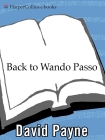Back to Wando Passo by David Payne (each kindness read aloud txt) 📗

- Author: David Payne
Book online «Back to Wando Passo by David Payne (each kindness read aloud txt) 📗». Author David Payne
FIFTY-EIGHT
Bam…bam…bam…bam…bam…The Purdey’s maddening, repeated roar goes on and on through the long afternoon and deep into the dusk. Like a hand through smoke, the shot moves through the flock. And the black river is littered with them now, studded with dead birds, like strange bromeliads, feathered, warm and apple green, and yet they come, again, again, again, as though they’re as in love with dying as Harlan is with dealing death to them. And why does Harlan love it so? Because each explosion, each loud, violent jolt shouts down the voices in his head, drowns out the memories, reduces the whole world to white, ringing nothingness and almost makes it possible, for the duration of the blast, for Harlan to believe that he can stand what has been done to him and live.
For he’s heard the rumors long ago. Oh, yes. How could he not? Jules Poinsett told someone what he’d seen. That someone told someone else. The rumor spread. Eventually, it came to him. Harlan disbelieved at first, but at some point that changed. Was it on Morris Island in the pen? Yes, perhaps it was, lying in his shallow hole at night, gazing at the shivering stars as the fiddlers crept over the faces of the dead (he could hear them, when the gusts died, clicking at their work)…. There, as the star shells arced and burst, as the hot iron rained, as men in nearby holes cursed and groaned and wept and prayed…There, as the winter gales blew freezing spindrift over him, reduced to a shivering, half-naked thing, it was easy to remember that his father had loved Jarry best. Paloma had. The Negroes…Who, in fact, had not? Race, so big a thing—in the end, what difference had it made? And why should she, his wife, be different from the rest?
Staring at the stars was sometimes too unbearable, and Harlan closed his eyes and remembered standing on this dock, this very dock, his wedding day, with Tom—Tom Wagner, who had his face blown off at Moultrie (Harlan stood not ten feet away)—remembered standing arm in arm and singing, “She Walks in Beauty Like the Night.” How long it took to find the music, to get the men together for the thing! But what came back to Harlan in his hole was Addie’s blush, the momentary flicker of embarrassment in her blue, mobile eyes, which concealed so little, as he offered her the granadilla, the berry of the passion fruit brought all the way from Cuba, up through the blockade. That became his settled memory of her, and it would come upon him suddenly and he groaned like those around him, each in his own private hell, actually groaned aloud and rolled onto his face, seeking contact with the ground, the cold, cold earth itself, to conduct away from him the hot and stinging shame he felt and feels again right now, as he pulls the trigger, as the tears streak down his face. For a long time, Harlan blamed Poinsett for spreading ugly lies, blamed himself for putting any credence in them. But, imperceptibly, it came to seem to Harlan that Addie’s failure to appreciate the pains he took that afternoon was niggardly and mean, one small example on a longer and much heavier list. He came to doubt she’d ever loved or truly understood him, and Harlan ceased to blame himself and, from that point, began to blame his wife. And walking home from Delaware—where the few who made it had been shipped again when Charleston fell in February ’65—it seemed to him that Poinsett might not be lying after all. And if he wasn’t, what was Harlan going to do? Somehow, he thought, when he got home the answer would be clear, but that was not the case. By the time he got to Powatan, his sole clear impulse was to stop at Pringle’s and buy this bag of 08 shot. And here he is this afternoon, knowing only that dark is coming on apace and now, or soon, he’s going to have to put the gun away and walk up to the house and look her in the face and ask.
She’s waiting for him when he comes. She’s at the table with the chicken fried that morning and the lamp is lit. Her hands are folded in her lap. Her face is grave.
“So, Addie,” he calls as he sets the Purdey on its stock, “shall we eat?”
“I’m not hungry, Harlan. I’ve made a plate for you.”
He turns. “I’m not hungry either. Shall we retire?”
“I cannot share a bed with you tonight.”
He stares. “And why is that?”
“I simply can’t.”
“I see. You know, Addie, there’s been talk….” He pours what’s left of the Jerez. “Poinsett told me you’d protected him….”
“I love him, Harlan.”
“So it’s true,” he says.
“It’s true.”
“You’re a whore—you know that, don’t you?”
“I am not a whore.”
“You’ve betrayed me.”
“Yes,” she says, “I have. I betrayed you when I married without love. For that, I ask your forgiveness. But for loving Jarry? For that I will not apologize.”
“You bitch…you filthy bitch,” he says. “It isn’t only me. You’ve betrayed your name, your family, your class, your race.”
“But I’ve been true to something





Comments (0)